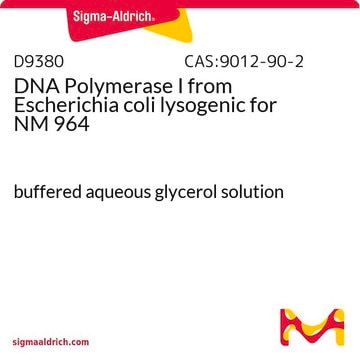D8276
DNA Polymerase I, Klenow Fragment from Escherichia coli
buffered aqueous glycerol solution
Sign Into View Organizational & Contract Pricing
All Photos(1)
About This Item
Recommended Products
grade
for molecular biology
Quality Level
form
buffered aqueous glycerol solution
mol wt
103 kDa
concentration
~3,000 units/mL
UniProt accession no.
foreign activity
Endonuclease, none detected
shipped in
wet ice
storage temp.
−20°C
Gene Information
Escherichia coli K12 ... polA(948356)
General description
DNA polymerase I yields two fragments (small and large) upon protease digestion. The large fragment (Klenow fragment) loses the 5′ exonuclease activity that is present in the intact holoenzyme. However, it retains both the polymerase 5′→3′ activity and the 3′→5′ exonuclease activity of the native enzyme.
Application
Suitable for:
- DNA sequencing by the Sanger dideoxy method
- Synthesis of the complementary strand of cDNA
- Filling in 5′-overhangs in double stranded DNA to form blunt ends
- Mutagenesis of DNA with second strand synthesis using oligonucleotides
- Labeling DNA by the random primer method
Components
DNA Polymerase I is supplied as a solution in 50 mM Tris-HCl (pH 7.5), 1 mM EDTA, 5 mM dithiothretol, and 50% glycerol (v/v) .
Unit Definition
One unit converts 10 nanomoles of deoxyribonucleoside triphosphates into acid insoluble material in 30 min. at 37 °C.
Reconstitution
The enzyme solution may be diluted with 50 mM Tris-HCl, pH 7.5, 100 mM ammonium sulfate, 10 mM 2-mercaptoethanol, and 1 mg/ml bovine serum albumin.
Analysis Note
The activity is assayed in a reaction mixture containing 50 mM potassium phosphate (pH 7.5), 3 mM MgCl2, 1 mM 2-mercaptoethanol, 32.5 μM 32P-dATP, 32.5 μM dTTP, 62.5 μg/ml poly(dA-dT) and 0.01-1 unit enzyme.
related product
Product No.
Description
Pricing
Glutathione S-Transferase from E. coli, recombinant, expressed in E. coli, buffered aqueous solution
Ribonuclease A from bovine pancreas, for molecular biology, ≥70 Kunitz units/mg protein, lyophilized
Signal Word
Danger
Hazard Statements
Precautionary Statements
Hazard Classifications
Resp. Sens. 1
Storage Class Code
10 - Combustible liquids
WGK
WGK 1
Flash Point(F)
Not applicable
Flash Point(C)
Not applicable
Personal Protective Equipment
dust mask type N95 (US), Eyeshields, Gloves
Certificates of Analysis (COA)
Search for Certificates of Analysis (COA) by entering the products Lot/Batch Number. Lot and Batch Numbers can be found on a product’s label following the words ‘Lot’ or ‘Batch’.
Already Own This Product?
Find documentation for the products that you have recently purchased in the Document Library.
Customers Also Viewed
H Klenow et al.
Proceedings of the National Academy of Sciences of the United States of America, 65(1), 168-175 (1970-01-01)
Purification of DNA polymerase from E. coli B has in two cases each time led to the isolation of two separate polymerase activities, enzyme A and enzyme B. Enzyme A was in contrast to enzyme B almost completely devoid of
L M Houdebine
Nucleic acids research, 3(3), 615-630 (1976-03-01)
E.Coli DNA polymerase I (Klenow subfragment) was used for the synthesis of complementary DNA with the mRNAs for rabbit milk proteins as templates. The cDNA formed, contained 200 nucleotides and represented about 20% of the mRNA template. The cDNA was
Second-strand cDNA synthesis: mRNA fragments as primers.
U Gubler
Methods in enzymology, 152, 330-335 (1987-01-01)
Yossi Weizmann et al.
Journal of the American Chemical Society, 126(4), 1073-1080 (2004-01-30)
The ultra-sensitive magneto-mechanical detection of DNA, single-base-mismatches in nucleic acids, and the assay of telomerase activity are accomplished by monitoring the magnetically induced deflection of a cantilever functionalized with magnetic beads associated with the biosensing interface. The analyzed M13phi DNA
R B Wallace et al.
Science (New York, N.Y.), 209(4463), 1396-1400 (1980-09-19)
Many eukaryotic genes contain intevening sequences, segments of DNA that interrupt the continuity of the gene. They are removed from RNA transcripts of the gene by a process known as splicing. The intervening sequence in a yeast tyrosine transfer RNA
Our team of scientists has experience in all areas of research including Life Science, Material Science, Chemical Synthesis, Chromatography, Analytical and many others.
Contact Technical Service









